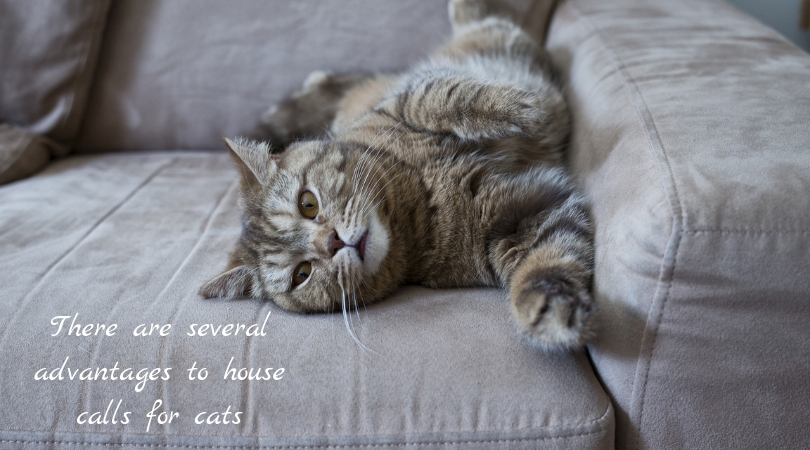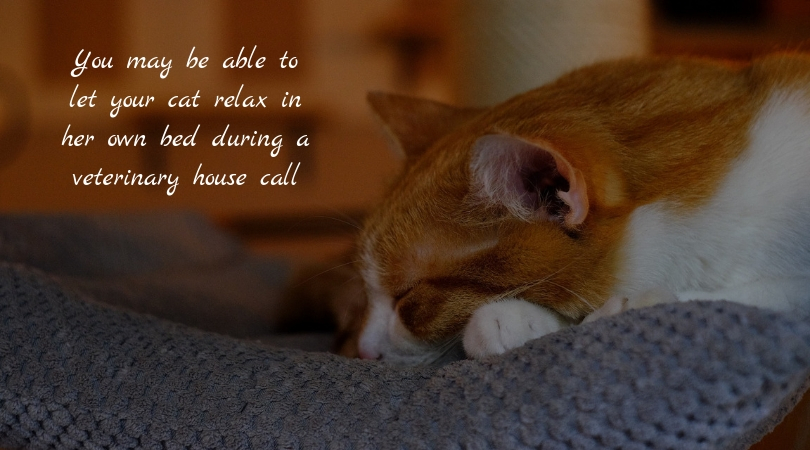While many cats can tolerate a trip to the vet, the whole experience can potentially be very stressful for both pet and owner. There is the initial step of attempting to find your cat, who may have an amazing gift of extrasensory perception and is hidden somewhere in the house. After finding them, you then have to load them into the carrier, which can be difficult, especially if you haven’t worked on training and practice. Then there is the car drive to the vet’s office. If your cat experiences car sickness or just gets stressed by the moving vehicle, they will let you know with some pretty scary vocalizations and possibly eliminating in the carrier. Finally, there is the strange environment of the veterinarian’s office, which may include barking dogs and other excitement.
It’s a fact that cats visit the vet less often than dogs, and one of the main reasons for this is the stress involved in getting them there. However, regular wellness exams are crucial to your cat’s wellbeing, and veterinary appointments are a necessity. If getting your cat to the vet is problematic, perhaps having your veterinary team make a house call is a good option.
Advantages of Cat House Calls

There are several advantages to consider to help you decide if a house call is right for your cat:
Convenience
Probably the greatest and most obvious advantage to a house call is the convenience it brings to you the pet owner. Having the veterinary team do the traveling saves you that time driving to and from the vet office. This can be especially helpful if you’re trying to juggle the appointment with your work schedule or if you have family obligations. You won’t have to take the kids with you to the vet office since the veterinary team will be coming to you. This is also a beneficial service to anyone with transportation or mobility issues.
Less Stress for You and Your Cat
As previously mentioned, there can be a lot of stress involved with finding your cat, getting them into the carrier, and driving through traffic. This can be eliminated for the pet owner by having a house call. House calls can also reduce the amount of stress your cat experiences. If your cat gets carsick or just doesn’t like being in a moving vehicle, they won’t have to endure the travel. If your cat resists being placed in the carrier, a house call eliminates that stress as well. It’s also important to note that if your cat does have issues with using a carrier, be sure to ask the veterinary team about training tips to get them to be comfortable with one -- house calls are not always an option, particularly in the event of an emergency.
A Controlled Environment
Having the appointment in your cat’s familiar environment can remove other stresses and provide a more comfortable and relaxed space. If barking dogs scare your cat, a house call, rather than going to the vet’s office, will eliminate that stress for your cat. Familiar scents can also help keep your cat at ease during the exam. Your cat’s bedding can even be used. This can also help provide a better overall exam of your cat. If your cat is relaxed and acting naturally, they will be less likely to try to hide any pain or discomfort they might be experiencing so the veterinary team can get an accurate assessment.

Multiple Cats
House calls are a great option if you own more than one cat. You’ll have the convenience of not having to haul several carriers around. Even a small cat becomes heavy in a hard-sided carrier, so transporting two or more of these can be quite the feat! Carriers can tend to take up a lot of space in a vehicle, so we recognize that this can be a constraint for pet owners with smaller cars.
End of Life Care
If you find yourself in the difficult situation of having a seriously ill cat, you may be faced with the decision to have them euthanized. In the event that the most humane treatment for your cat is to be euthanized, you may want to consider having that procedure done in your home. Some families feel more comfortable being in the privacy and familiarity of their own home for this service. It may give you and your family the feeling of providing a more dignified service and create more of a celebration of life for your beloved pet in comfortable surroundings.
Disadvantages
With all of these benefits of scheduling a veterinary house call, there are some possible disadvantages that should be considered. The veterinary team may not have the full diagnostic capabilities that they would if at the veterinary hospital. Certain equipment is extremely portable, but in some cases there may be examination procedures that will need to be followed up with a visit to the office. If there are any lab tests needed, they will have to be run once the team gets back to the office, so it will take a bit more time to get results. This is particularly important to consider if your cat is experiencing an emergency.
What to Do Before Our Team Arrives
 If you do make the decision to schedule a house call for your cat, there are still some things you will need to do in preparation for the exam. While your cat doesn’t need to be placed in a carrier, they will still need to be located and confined to a small room where they can be quickly and easily handled. A small room with no possible hiding spots is best. You will also need to identify an appropriate location for the exam and treatment. This could be the same room where you confine your cat in preparation for the appointment. Whatever the location, it should be well lit, tidy, and free of hiding areas. There should be enough room for the team to perform the exam, and you should have a flat surface available for the exam and treatment. Be sure to provide the veterinary team any instructions for parking or alert them if your house is tricky to find as well.
If you do make the decision to schedule a house call for your cat, there are still some things you will need to do in preparation for the exam. While your cat doesn’t need to be placed in a carrier, they will still need to be located and confined to a small room where they can be quickly and easily handled. A small room with no possible hiding spots is best. You will also need to identify an appropriate location for the exam and treatment. This could be the same room where you confine your cat in preparation for the appointment. Whatever the location, it should be well lit, tidy, and free of hiding areas. There should be enough room for the team to perform the exam, and you should have a flat surface available for the exam and treatment. Be sure to provide the veterinary team any instructions for parking or alert them if your house is tricky to find as well.
Hopefully this gives you some idea as to whether having your cat’s veterinary appointments in your home might work well for you. If you have any questions you should contact your veterinary team.
